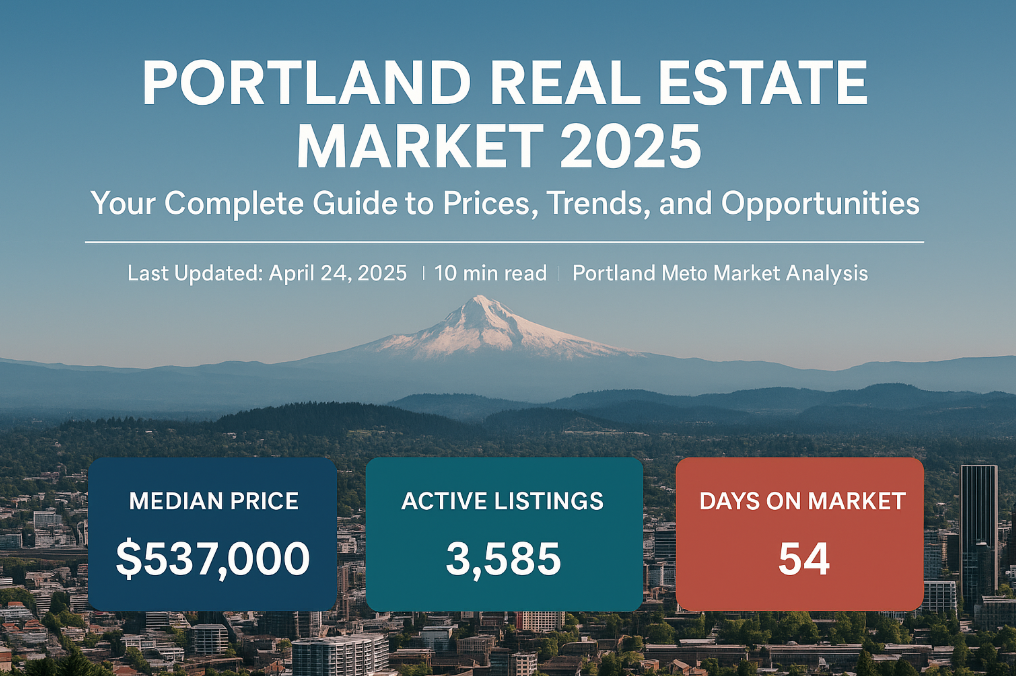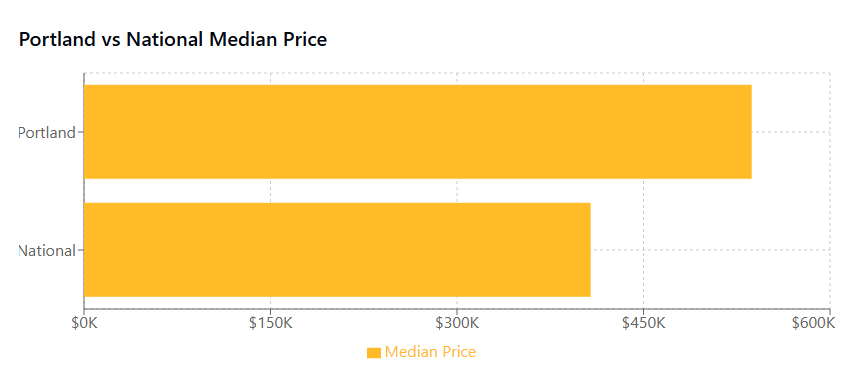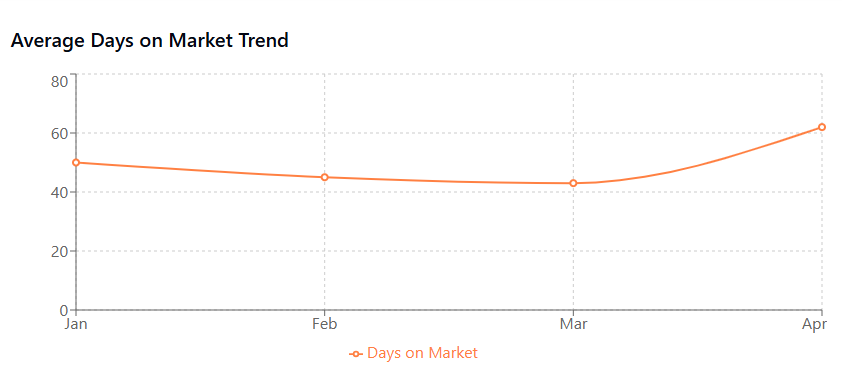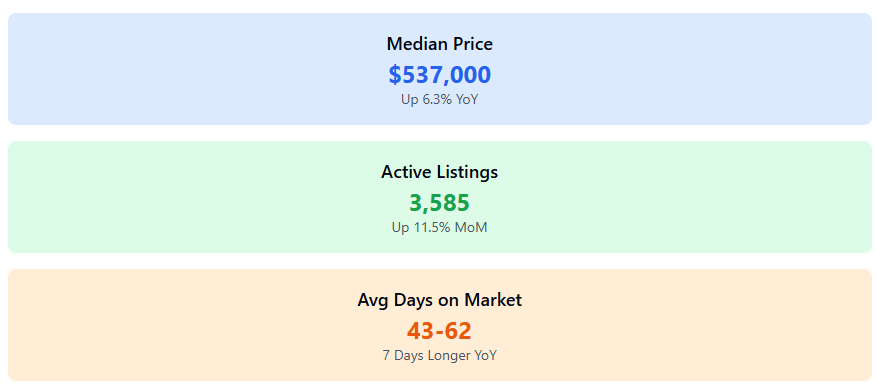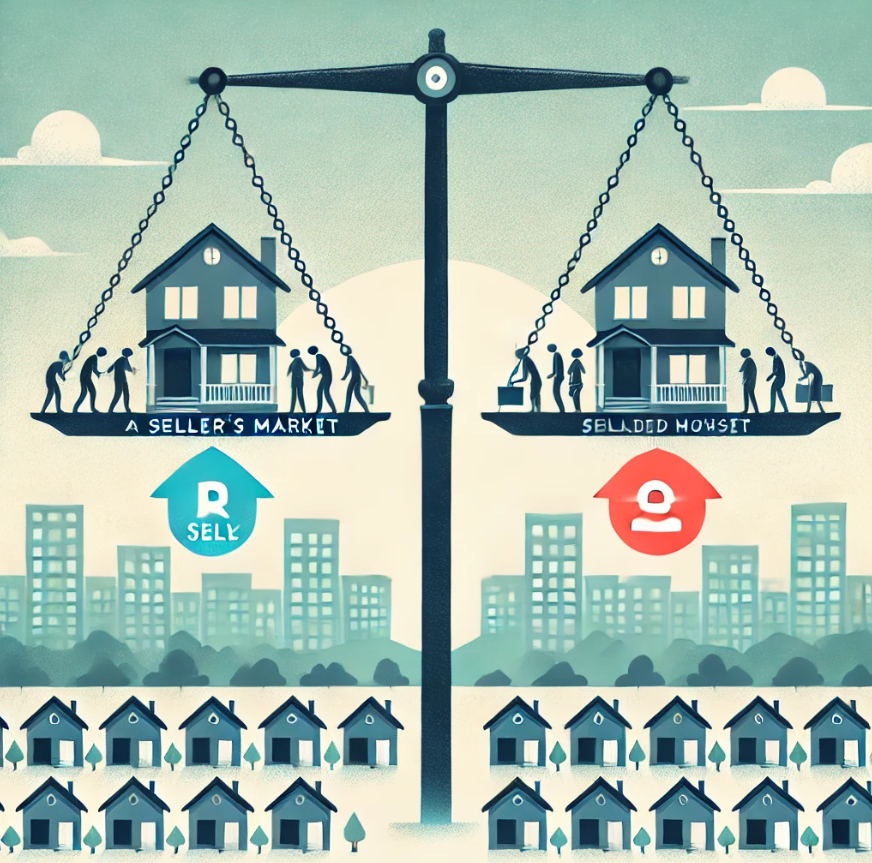Why Now is a Great Time to Buy a Home in the Portland-Vancouver-Hillsboro Metro Area…
Portland Real Estate Market 2025: Your Complete Guide to Prices, Trends, and Opportunities
10 min read | Portland Metro Market Analysis
The Portland real estate market continues to evolve in 2025, offering both challenges and opportunities for buyers, sellers, and investors. As we navigate through changing interest rates, shifting demographics, and ongoing supply constraints, understanding the current market dynamics is more crucial than ever. Let’s dive deep into the numbers and trends shaping Portland’s housing landscape today.
The Current State of Portland Real Estate
Portland’s housing market has maintained its resilience through various economic shifts, and 2025 is no exception. With a median home price of $537,000, our market continues to outperform national averages while showing signs of healthy normalization after the pandemic-era boom. The average sale price now sits at $600,300, representing a 6.3% increase from last year.
What makes Portland unique is our Urban Growth Boundary, which continues to limit outward expansion and maintain property values. This policy, combined with our area’s strong job market in tech, healthcare, and green energy sectors, creates a foundation for sustained long-term growth.
Price Trends: A Five-Year Perspective
Looking back over the past five years reveals just how dramatically Portland’s housing market has transformed. With a 57% increase in home values since 2020, homeowners have seen substantial equity gains. This translates to approximately $195,000 in appreciation for the typical Portland homeowner.
The trajectory hasn’t been linear, however. We saw explosive growth in 2021-2022, followed by a more moderate pace in 2023-2024, and now what experts call a “soft landing” in 2025. This normalization is actually healthy for the market, bringing us closer to historical average appreciation rates of 2-3% annually.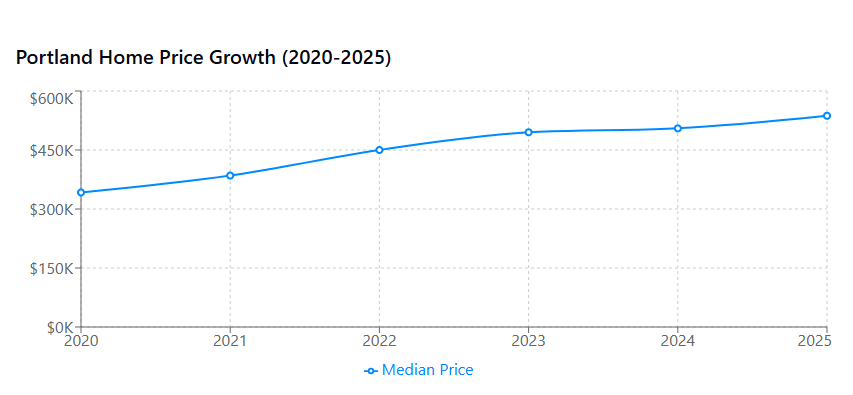
Neighborhood Dynamics: Where Values Are Heading
Portland’s diverse neighborhoods each tell their own story. Beaverton continues to command the highest prices in the metro area, driven by excellent schools and proximity to tech employers. Meanwhile, Gresham offers the most affordable entry point for buyers, coupled with the highest potential for appreciation.
The fastest-selling neighborhoods include Sabin, Markham, Buckman, and Concordia, where homes often receive multiple offers within days of listing. In contrast, areas like Crestwood, Ashcreek, and Arnold Creek have seen the highest rates of homeowner retention, indicating strong community satisfaction and stability.
The Bedroom Count Factor
An interesting trend has emerged in how different property types are performing. One-bedroom homes have seen the strongest appreciation at 2.7%, likely driven by investor interest and first-time buyer demand. Surprisingly, two-bedroom properties have experienced a slight decline of 1.7%, potentially due to oversupply in certain condo developments.
Three-bedroom homes, typically the sweet spot for families, maintain steady growth at 1.4%. The larger homes with four or more bedrooms show more modest gains, reflecting the current economic climate where buyers are more budget-conscious.
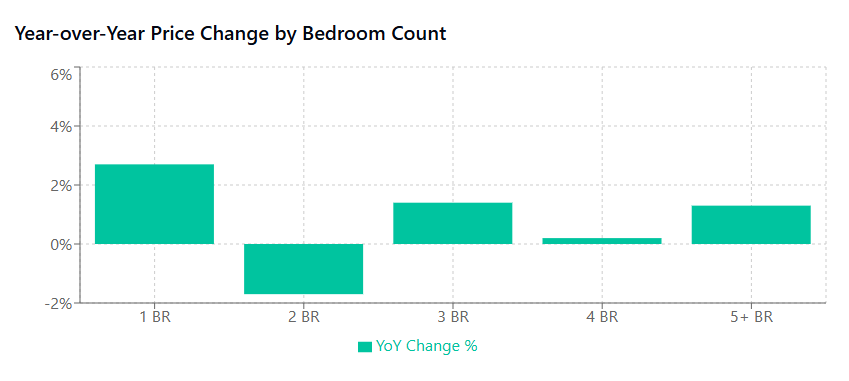 Portland vs. National Markets
Portland vs. National Markets
Portland’s market continues to command a significant premium over national averages. With our median price at $537,000 compared to the national median of $407,500, Portland homes are valued 32% higher. This gap reflects our region’s desirability, economic strength, and constrained supply.
The premium is justified by several factors: our robust job market, quality of life amenities, environmental consciousness, and the physical constraints imposed by geography and the Urban Growth Boundary. These elements combine to create sustained demand that outpaces supply.
Market Dynamics: Inventory and Days on Market
One of the most significant shifts in 2025 has been the increase in inventory. With 3,585 active listings, we’re seeing an 11.5% increase from last month and a 31% increase year-over-year. While this is good news for buyers, we’re still operating at only 3.7 months of supply – firmly in seller’s market territory.
Homes are spending more time on the market, averaging 43-62 days depending on the area. This is a notable increase from the frenzied pace of 2021-2022 when properties often sold within hours of listing. This slowdown gives buyers more time to make informed decisions and potentially negotiate better terms.
Interest Rates and Affordability
The interest rate environment continues to be a major factor in Portland’s housing market. With current rates hovering around 7%, affordability has become a significant challenge for many buyers. While some experts predict rates could drop to 5.5% by mid-2025, it’s important to approach these forecasts with healthy skepticism.
Rate predictions are a lot like weather forecasts beyond a week out – more educated guesswork than guaranteed outcomes. If we had listened to the predictions from early 2024, we’d be sitting in 4% rates right now. Instead, we’re still navigating 7% territory. The reality is that rate movements depend on complex economic factors that even the Fed can’t fully control.
A hypothetical rate drop to 5.5% would reduce monthly payments by approximately $300-400 on a median-priced Portland home. This could bring many sidelined buyers back into the market, potentially increasing competition and supporting price stability. But rather than banking on predictions, smart buyers and homeowners should make decisions based on current conditions and their personal financial situations.
The Equity Windfall
For existing Portland homeowners, the news is overwhelmingly positive. The average homeowner with a mortgage now has approximately $311,000 in equity. Those who bought five years ago have seen their equity grow by roughly $287,000, thanks to appreciation and principal paydown.
This substantial equity position opens numerous opportunities for homeowners:
- Trading up to larger homes or better neighborhoods
- Funding home improvements that further increase value
- Starting investment property portfolios
- Launching businesses or funding education
Suburban Shifts and Migration Patterns
The Portland metro area is experiencing interesting demographic shifts. While the city proper has seen slight population declines, suburban areas like Vancouver, WA, Hillsboro, and Gresham are growing. This trend reflects changing work patterns, affordability concerns, and lifestyle preferences post-pandemic.
Vancouver, in particular, has become increasingly attractive to Portland-area buyers seeking more affordable options without sacrificing proximity to urban amenities. The absence of state income tax in Washington adds to its appeal for many professionals.
Investment Opportunities
For real estate investors, Portland continues to offer compelling opportunities. The rental market remains tight with vacancy rates around 4.5%, ensuring steady cash flow potential. Areas like Gresham present particularly attractive entry points for investors, combining lower acquisition costs with strong appreciation potential.
The city’s ADU-friendly policies also create unique opportunities for homeowners to generate additional income or provide multi-generational housing solutions. With construction costs stabilizing, 2025 could be an ideal time to add value through strategic property improvements.
Looking Ahead: 2025-2026 Forecast
Market forecasts suggest a period of stabilization rather than dramatic growth or decline. Some experts predict a slight correction of 0.8% by January 2026, but here’s the truth: real estate predictions are about as reliable as a long-range forecast for an Oregon spring. Remember when experts predicted Portland’s market would cool in 2021? Instead, we saw record-breaking price increases.
Rather than fixating on crystal ball predictions, focus on actual market fundamentals:
- Current inventory levels and their impact on competition
- Actual (not predicted) interest rate movements
- Real-time population and migration data
- Current economic indicators rather than forecasted ones
The best approach? Make decisions based on your personal circumstances and today’s market realities, not tomorrow’s predictions. Whether you’re buying, selling, or holding, your strategy should be flexible enough to adapt to whatever the market actually delivers – not what the experts guess might happen.
Action Steps for Market Participants
For Buyers:
- Get pre-approved now to be ready when rates drop
- Consider emerging neighborhoods for better value
- Be prepared to act quickly in competitive situations
- Look at fixers in prime locations for equity-building potential
For Sellers:
- Price strategically based on recent comparables
- Invest in pre-listing improvements for maximum return
- Consider spring listing for optimal market conditions
- Be flexible with closing terms to attract more buyers
For Investors:
- Focus on areas with strong rental demand
- Consider value-add opportunities in established neighborhoods
- Explore ADU potential on suitable properties
- Monitor interest rate trends for refinancing opportunities
The Bottom Line
Portland’s real estate market in 2025 represents a return to more sustainable growth patterns while maintaining fundamental strength. Limited supply, diverse economic drivers, and quality of life factors continue to support property values. Whether you’re buying, selling, or investing, understanding these market dynamics is crucial for making informed decisions.
The combination of substantial homeowner equity, predicted interest rate declines, and ongoing demand creates a market environment ripe with opportunity for those who are prepared and well-informed.
Need Expert Guidance in Portland’s Market?
Contact me for:
- Comprehensive market analysis for your specific neighborhood
- Strategic pricing consultations
- Investment property evaluation
- First-time homebuyer education
- Equity assessment and planning
Data sources: Redfin, Realtor.com, RMLS Portland, Zillow, Portland Monthly, NoRada Real Estate
Tags: Portland real estate market 2025, Portland home prices, Portland housing forecast, Portland property values, Portland real estate trends, Portland home equity

